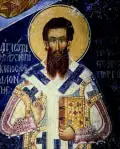St. Gregory Palamas: Why did [the Prodigal Son] not set off at once instead of a few days after?
“And not many days after,” it says, “the younger son gather all together, and took his journey into a far country” (Luke 15:13). Why did [the Prodigal Son] not set off at once instead of a few days after? The evil prompter, the devil, does not simultaneously suggest to us that we should do what we like and that we should sin. Instead he cunningly beguiles us little by little, whispering, “Even if you live independently without going to God’s Church or listening to the Church teacher, you will still be able to see for yourself what your duty is and not depart from what is good.” When he separates someone from the divine services and obedience to the holy teachers, he also distances him from God’s vigilance and surrenders him to evil deeds. God is everywhere present. Only one thing is far away from His goodness: evil. Being in the power of evil through sin we set off on a journey far away from God. As David says to God, “The evil shall not stand in thy sight” (Ps. 5:5).
+ St. Gregory Palamas, The Parables of Jesus, Sermons by St. Gregory Palamas


